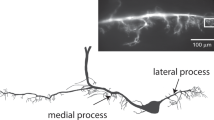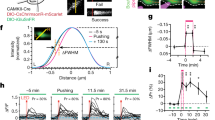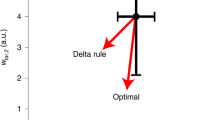Abstract
A UNITARY, monosynaptic excitatory postsynaptic potential (e.p.s.p.) can be recorded from cell R15 of the abdominal ganglion of Aplysia californica on appropriate stimulation of the right visceropleural connective. The amplitude of this e.p.s.p. undergoes a sequence of changes with trains of one or two stimuli per second. These changes include synaptic depression, frequency facilitation and post-tetanic potentiation. As described in detail elsewhere1,2, all these phenomena are apparently due to alterations in the amount of neurotransmitter released rather than to postsynaptic mechanisms. The frequency facilitation, a relatively transient phenomenon, is believed to be limited by the rate of neurotransmitter mobilisation into the pool available for release2. In contrast, the post-tetanic potentiation, a much more sustained phenomenon, is believed to be due to a change in the fraction of the available pool of transmitter released per stimulus2.
This is a preview of subscription content, access via your institution
Access options
Subscribe to this journal
Receive 51 print issues and online access
$199.00 per year
only $3.90 per issue
Buy this article
- Purchase on Springer Link
- Instant access to full article PDF
Prices may be subject to local taxes which are calculated during checkout
Similar content being viewed by others
References
Schlapfer, W. T., Woodson, P. B. J., Tremblay, J. P., and Barondes, S. H., Brain Res., 76, 267 (1974).
Schlapfer, W. T., Tremblay, J. P., Woodson, P. B. J., and Barondes, S. H., Brain Res., (in the press).
Hazel, J. R., and Prosser, C. L., Physiol., Rev., 54, 620 (1974).
Rosenthal, J., J. Physiol. Lond., 203, 121 (1969).
Hubbard, J. I., Jones, S. F., Landau, E. M., J. Physiol., Lond., 216, 591 (1971).
Fourcans, B., and Jain, M. K., Adv. Lipid Res., 12, 147 (1974).
Träuble, H., and Eibl, H., in Functional Linkage in Biomolecular Systems, (edit. by Schmitt, F. O., Schneider, S. M., and Crothers, D. M.), 59 (Raven, New York, 1975).
Tanaka, R., Rev. Neurosci., 1, 181 (1974).
Kito, M., Aibara, S., Kato, M., Ishinaga, M., and Hata, T., Biochim. biophys. Acta, 298, 69 (1973).
Traynor, M. E., Woodson, P. B. J., Tremblay, J. P., Schlapfer, W. T., and Barondes, S. H., Soc. Neurosci., Abstr. fifth Meeting (1975).
Seeman, P., Experientia, 30, 759 (1974).
Paterson, S. J., Butler, K. W., Huang, P., Labelle, J., Smith, I. C. P., and Schneider, H., Biochim. biophys. Acta, 266, 597 (1972).
Rahamimoff, R., in The Neurosciences: Third Study Program, (edit. by Schmitt, F. O., and Worden, F. G.), 943–952 (MIT, Cambridge, Massachusetts, 1974).
Ahkong, Q. F., Fisher, D., Tampion, W., and Lucy, J. A., Nature, 253, 194 (1975).
Author information
Authors and Affiliations
Rights and permissions
About this article
Cite this article
SCHLAPFER, W., WOODSON, P., SMITH, G. et al. Marked prolongation of post-tetanic potentiation at a transition temperature and its adaptation. Nature 258, 623–625 (1975). https://doi.org/10.1038/258623a0
Received:
Accepted:
Published:
Issue Date:
DOI: https://doi.org/10.1038/258623a0
This article is cited by
-
Effects of alcohols upon pacemaker activity in neurons ofAplysia californica
Cellular and Molecular Neurobiology (1982)
-
Increased membrane fluidity implicated in acceleration of decay of post-tetanic potentiation by alcohols
Nature (1976)
Comments
By submitting a comment you agree to abide by our Terms and Community Guidelines. If you find something abusive or that does not comply with our terms or guidelines please flag it as inappropriate.



